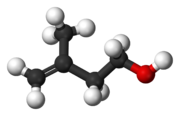
APPLICATIONS OF TECHNOLOGY:
- Biofuels
- Commodity chemicals
BENEFITS:
- Improves the isoprenol titer in the host Saccharomyces cerevisiae
- Creates a strong production system for isoprenol production
BACKGROUND:
Isoprenol (3-methyl-3-butene-1-ol) is a valuable biofuel and an important precursor of commodity chemicals. While a synthetic microbial system using the heterologous mevalonate (MVA) pathway has been developed to produce isoprenol in E. coli, there have been no significant examples of isoprenol production reported in S. cerevisiae. Since this budding yeast is already widely used in the biotechnology industry for isoprenoid production due to many advantages (e.g., inherent safety, robustness, good history of large-scale operation), it would be a desirable host for industrial scale isoprenol production.
TECHNOLOGY OVERVIEW:
Researchers at The Joint BioEnergy Institute have engineered S. cerevisiae for the biosynthesis of isoprenol, which can be upgraded to dimethylcyclooctane, an advantaged aviation fuel. It can also be used as a precursor to valuable chemicals.
The process consisted of using both the original MVA pathway as well as the isopentenyl diphosphate (IPP)-bypass pathway for isoprenol production. By identifying and constructing a knockout strain of a key endogenous gene, researchers were able to achieve 380 mg/L of isoprenol titer in a shake flask experiment, a substantial improvement over previous studies in yeast. Additionally, they screened and identified promiscuous phosphatases that improve isoprenol production in S. cerevisiae.
By enabling elevated levels of production of isoprenol via genetic modification of a yeast host cell, this technology ultimately addresses the need to rewire microorganismal metabolisms to achieve high titer, rate, and yield for commercial production.
DEVELOPMENT STAGE: Proven principle
FOR MORE INFORMATION:
https://ipo.lbl.gov/wp-content/uploads/sites/8/2016/01/2014-135_pub.pdf
PRINCIPAL INVESTIGATORS:
STATUS: Patent pending.
OPPORTUNITIES: Available for licensing or collaborative research.
SEE THESE OTHER BERKELEY LAB TECHNOLOGIES IN THIS FIELD:
Biosynthesis Pathways for Five-Carbon Alcohol from Mevalonate 2014-135
Production of Fatty-Acid-Derived Biofuels and Chemicals in Saccharomyces cerevisiae 2013-113